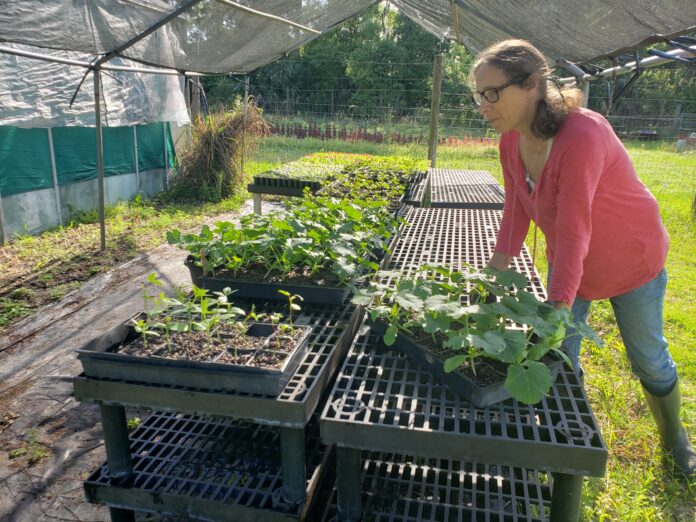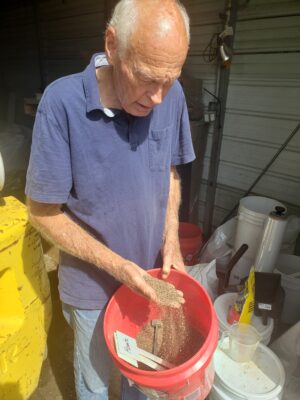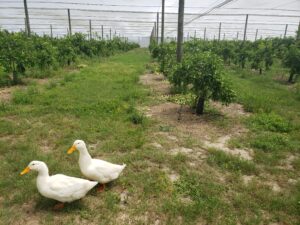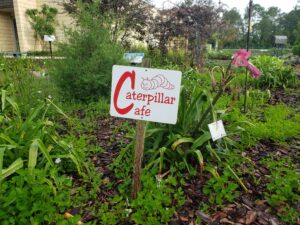
FROM HER FARM TO YOUR TABLE — Pauline Copello tends vegetable plants at her small farm in Barberville.
Growing your own fruits and vegetables isn’t too difficult. All it takes is space, time and the right know-how. Above all, you have to have an interest in gardening. That’s what got Pauline Copello started.
She and her husband have lived in their Barberville home since 2002. Nowadays, their yard has about an acre devoted to farming, where Copello grows vegetables and salad greens to sell as Pauline’s Lucky Market Garden.
Her tip for farmers just starting out? Whether you’re growing on an acre or a windowsill, whether you’re growing fruits, vegetables or herbs, you should compost.
Composting is, from the University of Florida’s Institute of Food and Agricultural Sciences, “the breakdown of organic materials by microorganisms.”
Much of what is typically thrown away in the kitchen can be saved to help nurture the food for your next meal; everything from potato peels to onion skins and eggshells. Even the grounds from your morning coffee have tasty potassium that your plants could be feasting on instead of store-bought fertilizer.
“Anything that doesn’t have to go in the landfill that can enhance your garden is good,” Copello said.
She collects food waste in a small plastic trash can and, every night, she empties its contents into a designated pile in her yard. It can take several months for the pile to start looking like something other than a collection of apple cores and eggshells, but, eventually, that pile of food waste will be dark, nutrient-rich humus — the byproduct of natural processes like rain and decomposers and bugs and worms working in the pile.
You need more than just compost to grow healthy plants, though.
“Compost is not a complete food for plants,” Copello said.
For the average gardener, the results of composting can be treated like fertilizer for plants and flowers. For people interested in growing their own food, Copello recommended a ratio of one-third humus from composting, mixed with two-thirds potting soil to provide seeds with natural, healthy fertilization.
Natural is the name of the game on Copello’s organic farm.
“We are trying to take care of and build our soil,” she said. “We’re trying to protect our waterways and encourage beneficial insects.”
Copello’s interest in organic farming methods comes from a love of the natural world and from her family members who have been cultivating plants since before she was born. For people with less institutional knowledge looking to get farms set up, she’s working on a guide to help them.
Growing Salad Greens: An Organic System for Central Florida Sandy Soils is designed for young, new farmers interested in getting into the business.
With Central Florida-specific information for irrigation, crop rotation and pest management, Copello hopes her guide will inspire people to rely less on grocery stores and more on food they know the source of because they grew it themselves.

MORE THAN JUST COMPOST — Quality Green Specialists, at 335 W. Michigan Ave., owner and master horticulturist Dana Venrick shows azomite, a natural mineral made from ground-up volcanic rock. Azomite, he said, is one of the keys to combating Florida’s sandy soil. “Don’t buy fertilizers that only have oxide forms of trace minerals,” Venrick said. “The microbes in the soil can’t break down oxide forms.” Florida’s soil is full of silicon oxide, but azomite can feed plants much-needed and easier to break down sodium dioxide. Combine the azomite with compost and some fertilizer, Venrick said, and your plants will grow. By ensuring you have the right amount of the right minerals in your soil, you’ll keep not just the plants healthy, but the bacteria that power processes like the carbon and nitrogen cycles. “A lot of people overlook the most important part, which, to me, is microbial life.”
But wait, there’s more
So you have nutrient-rich composted materials, but now you need to know where to put it. Many people simply don’t have the space or the time required to maintain a vegetable garden in their yards. Luckily, many plants can grow just as well in containers.
“You can do it on concrete, on a porch, a deck or a window,” Steve Crump told The Beacon. “You don’t need much space.”
Crump and his family own Vo-LaSalle Farms in DeLeon Springs, a pick-your-own vegetable farm where visitors can harvest their own greens, fruits and vegetables. Vo- LaSalle sports about an acre of land where plants — all in their own, individual pots — grow food for customers.
There are pros and cons to container-gardening, Crump said. He would know; he’s been container gardening at Vo-LaSalle for 15 years now.
Containers take up much less space than traditional gardening, and a gardener has much more control over where they put their plants. The soil in many Floridians’ backyards is too sandy to contain enough nutrients for plants to grow. Container gardening makes it easy to control the soil and composted humus that your plants are growing in.
With less space to spread out, potted plants need to be watered more often than their in-the-ground cousins, because their roots have less space to spread out.
For an operation as large as Crump’s, though, another benefit of container growing is not having to use heavy machinery to maintain plants. Containers also help keep away pesky nematodes — small worms that eat up plants.

BEACON PHOTO/NOAH HERTZ
Not all plants grow well in containers. Crump suggested avoiding root vegetables like potatoes and carrots that need lots of space to grow. But plenty of other plants grow perfectly well in containers. Crump suggested trying:
• Legumes, including black-eyed peas, zipper peas and green beans,
• Herbs, like basil,
• Cucumbers,
• Yellow squash,
• Peppers, everything from bell peppers to hot peppers,
• Leafy greens like spinach and lettuce.
Of course, growing in Florida means straying from the guidance on some store-bought seed packets. You’ll grow some of your best vegetables during a Florida winter, Crump said.
“You want to plant starting in August and plant again as soon as Valentine’s Day,” he said.
Florida summers are too rainy for some plants to really thrive, Crump warned, but springs and winters will yield tasty fruits and vegetables to enjoy.
Crump is taking his own advice, too. Vo-LaSalle will shut down for the summer in mid-May. Until then, the farm, at 601 Johnson Lake Road in DeLeon Springs, is open 10 a.m.-4 p.m. Thursday through Saturday. On Sundays, the farm is open noon-4 p.m.
Sustainability
Growing some of your own food is all well and good, but growing enough food to support a family would be a full-time job that requires much more space than most people have. Being a part of a sustainable food system means more than gardening, Dr. Sarah Cramer said.
Cramer is an assistant professor of sustainable food systems at Stetson University. One of her focuses is on getting her students to think of themselves as part of a local food network.
“Making sustainable or ethical choices in the food system shouldn’t be something you’re barred from doing if you don’t have space or money for a garden,” Cramer told The Beacon. “I love when people garden, and I love gardening, but I think sometimes we focus on that so much and forget community-oriented ways to have a sustainable food system.”
A more holistic approach toward food means shopping locally — at farmers markets and directly from farmers — as well as growing some of your own, Cramer said.
For her, this means getting vegetables every Friday from a grower with whom she has a community-supported agriculture, or CSA, agreement. Cramer supports Noble Roots Farm, a meat and vegetable farm in Eustis through a CSA.
Cramer paid upfront at the beginning of the growing season, and now, every week, she gets a share of the produce grown on the farm.
“The CSA model is one I really believe in,” Cramer said. “As a consumer, you get whatever he has. Sometimes you’re really forced to stretch your creativity in the kitchen. That’s another way to feel really connected to the rhythms of the season.”
Even if you aren’t growing enough food to support yourself, Cramer encourages her students and everyone to try it out.
“It’s really hard to grow food, and even if we’re not gardening to feed ourselves specifically, we’re building empathy for people who do this for a living,” she said. “If a pest comes through, I can go to the grocery store. If I’m doing that for a living, I don’t have that option.”
But there are more ways to contribute to your community food system. Cramer suggested reaching out to local farmers to see if they could use a hand.
“There’s literally always work to be done on a farm,” she said. “I think that’s one more way to come in contact with where your food’s coming from, and contribute to the vibrancy of the food system.”
Part of that vibrancy is knowing who grew your food, Barberville farmer Pauline Copello said.
Being able to trace food back to a local farmer’s field is appealing, especially as the area’s population continues to grow.
“Over the last 15 years, people have been more concerned with food security and what’s on their food,” Copello said. “There is a need for more local food.”

FULL OF IDEAS — The Caterpillar Cafe is just one of the demonstration gardens at the University of Florida Institute of Food and Agricultural Sciences campus at 3100 E. New York Ave. Prospective gardeners, or anyone with questions, can call the extension office at 386-822-5778 for help on getting their garden set up.